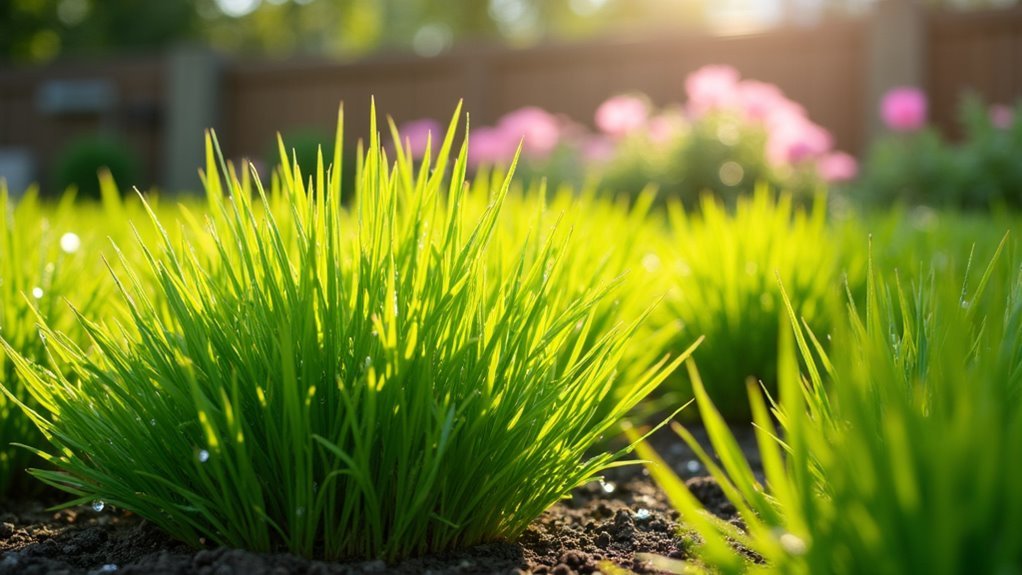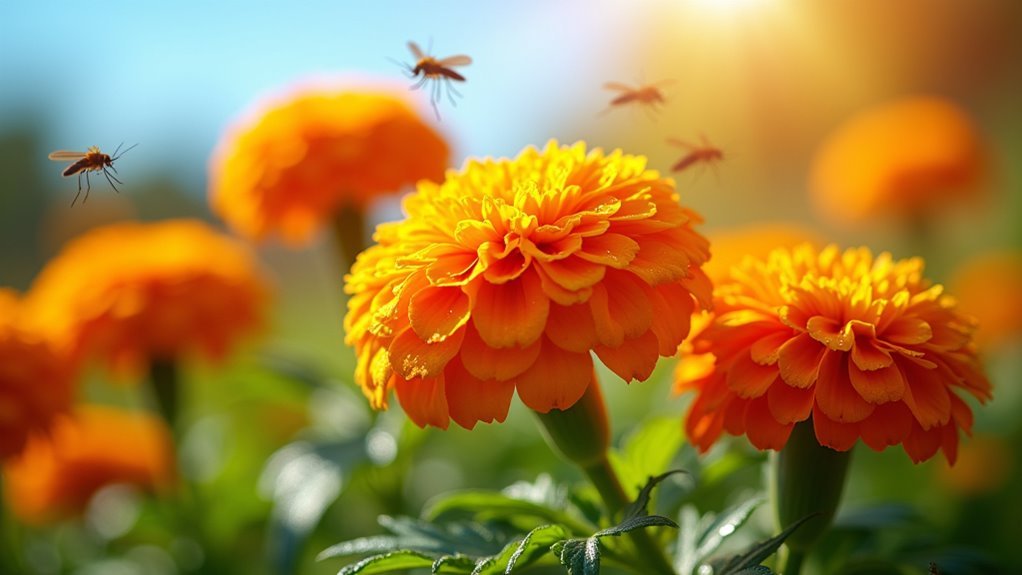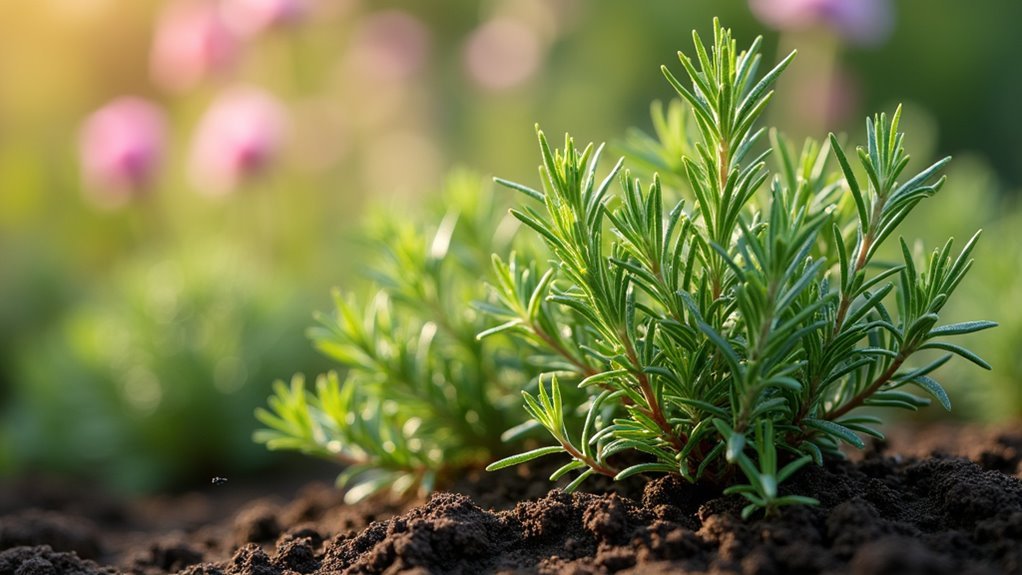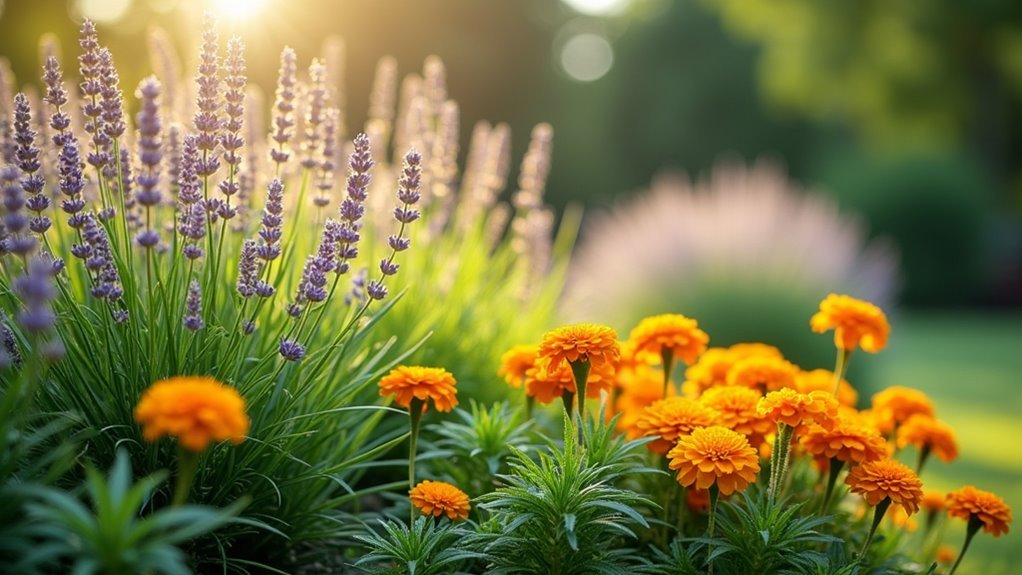You can effectively repel mosquitoes from your garden by planting aromatic herbs and flowers that naturally deter these pests. Citronella grass, lavender, and peppermint release strong scents that mask human odors mosquitoes find attractive. Marigolds and geraniums add vibrant colors while producing compounds that create an unwelcoming environment for flying insects. Basil, rosemary, and garlic offer dual benefits as culinary herbs and natural repellents. These plants thrive in full sun with well-drained soil, and there’s much more to discover about maximizing their mosquito-fighting potential.
Citronella Grass: The Classic Mosquito Deterrent

When it comes to natural mosquito control, citronella grass stands as the undisputed champion that’s been protecting outdoor spaces for generations.
You’ll recognize this powerful member of mosquito-repellant plants by its strong lemon scent that mosquitoes absolutely despise. Growing up to 6 feet tall, it’s perfect for containers where you can move it indoors during winter months.
You’ll want to plant your citronella in full sun with well-drained soil for ideal growth. The plant’s citrus fragrance naturally enhances your outdoor areas while keeping pests at bay.
For maximum effectiveness, crush the leaves regularly to release concentrated oils that intensify the repelling properties. This low-maintenance grass transforms any garden into a mosquito-free sanctuary.
Lavender: Beautiful Blooms With Bug-Fighting Power
While citronella grass offers impressive protection, lavender delivers a winning combination of mosquito-repelling power and stunning visual appeal that’ll transform your outdoor space into both a sanctuary and showcase.
Lavender transforms your outdoor space into a mosquito-free sanctuary while delivering stunning visual appeal and natural protection.
This hardy perennial thrives in full sun and well-drained soil across USDA zones 5-10, producing vibrant purple blooms from late spring through summer. Lavender’s calming fragrance delights humans while serving as an effective natural deterrent against mosquitoes and flying pests.
You can extract essential oils from the flowers to create homemade sprays for enhanced protection. Plant lavender in garden beds or containers around seating areas to considerably reduce mosquito presence.
You’ll enjoy a beautiful, fragrant garden that naturally keeps unwanted bugs at bay while creating a more enjoyable outdoor environment.
Marigolds: Colorful Flowers That Mosquitoes Hate

You’ll love how marigolds combine stunning visual appeal with powerful mosquito-repelling abilities through their distinctive scent.
These hardy annual flowers release natural compounds that effectively deter mosquitoes while adding vibrant orange, yellow, and red colors to your garden spaces.
Whether you’re planting them in containers or garden beds, marigolds offer simple care requirements that make them perfect for both novice and experienced gardeners seeking natural pest control.
Marigold Mosquito Repelling Properties
Although mosquitoes seem drawn to most flowering plants, marigolds break this pattern by emitting a distinct scent that actively repels these persistent pests.
You’ll find these vibrant flowers work as an effective natural deterrent because their strong-smelling compounds create an unappealing environment for mosquitoes. When you plant marigolds in your garden, you’re not just adding beautiful color – you’re establishing a protective barrier against unwanted insects.
The compounds that make marigolds so effective don’t just repel mosquitoes; they also deter other garden pests, giving you dual benefits from a single planting choice.
You can strategically place these low-maintenance annuals near entryways or throughout vegetable gardens, where they’ll thrive in sunny locations while providing continuous protection against insect bites.
Planting and Care Tips
Since marigolds adapt easily to various growing conditions, you can establish them successfully in almost any sunny spot throughout your garden. When planting these vibrant annuals, choose locations with well-drained soil and full sun exposure for ideal growth.
You’ll find they work perfectly in garden beds, containers, or interplanted among vegetables where their mosquito-repelling properties protect surrounding crops.
Your care tips routine should include regular deadheading of spent blooms to maintain continuous flowering and maximize their pest-deterrent effects. This simple maintenance task keeps plants looking fresh while enhancing their natural mosquito-repelling capabilities.
Consider positioning marigolds near entryways, patios, and outdoor seating areas where you’ll benefit most from their cheerful colors and effective insect-deterring qualities throughout the growing season.
Basil: Culinary Herb That Doubles as Pest Control
While most gardeners grow basil for its aromatic leaves that enhance countless dishes, this versatile herb serves double duty as an effective mosquito deterrent. You’ll find that basil’s strong scent naturally masks human odors that attract mosquitoes, making it one of nature’s best natural mosquito repellents.
This culinary herb thrives in warm weather and well-drained soil, requiring full sun to maximize both its mosquito repelling properties and flavor intensity. You can plant basil in garden beds or containers for flexible placement around outdoor living spaces.
Consider growing different varieties like Sweet Basil or Thai Basil to expand your pest control coverage while adding diverse flavors to your kitchen.
You’ll enjoy fresh herbs for cooking while creating a natural barrier against these unwanted pests.
Rosemary: Woody Fragrance for Natural Protection

Another aromatic herb that packs a powerful punch against mosquitoes is rosemary, whose woody fragrance creates an equally effective natural barrier. This hardy herb grows up to three feet tall and thrives in full sun with well-drained soil, making it perfect for various garden conditions.
| Benefit | Impact |
|---|---|
| Mosquito Repellent Power | Masks human scents that attract pests |
| Culinary Versatility | Fresh herbs for your favorite recipes |
| Placement Flexibility | Containers or garden beds near patios |
You’ll appreciate rosemary’s dual purpose as both natural protection and culinary enhancement. Plant it strategically around outdoor seating areas where you spend time, and you’ll create an aromatic shield while having fresh herbs within reach for cooking.
Lemon Balm: Citrus Aroma That Repels Flying Pests
Lemon balm brings exceptional mosquito-fighting capabilities to your garden through its powerful citrus fragrance that naturally deters flying pests.
This mint family member combines effective repelling mosquitoes action with remarkable versatility, thriving in various lighting conditions while remaining drought-resistant.
You’ll maximize lemon balm’s natural pest deterrence by crushing the leaves near seating areas, intensifying the citrus aroma that insects avoid.
This fast-growing herb adapts perfectly to containers or garden beds, delivering both protection and visual appeal.
Key benefits of growing lemon balm:
- Strong citrus scent repels mosquitoes and flying insects
- Drought-resistant and adaptable to different light conditions
- Dual-purpose plant offering pest control and culinary uses
- Low-maintenance growth in pots or garden beds
Beyond mosquito control, you’ll enjoy lemon balm’s culinary versatility in teas and cooking.
Catnip: Surprisingly Effective Mosquito Repellent
Catnip delivers mosquito-repelling power that surpasses even commercial DEET-based products, thanks to its potent nepetalactone compound.
You’ll find this hardy perennial incredibly easy to grow, reaching three to five feet in height while thriving in various garden conditions.
While catnip attracts your feline friends, it’s simultaneously repelling mosquitoes with its strong scent. You can plant it in garden beds or containers near outdoor seating areas for maximum mosquito protection.
Simply crush the leaves to release more of the repelling compounds when you need immediate relief.
This low-maintenance plant requires minimal care but spreads vigorously, so you’ll need to manage its growth periodically.
You’re getting dual benefits: happy cats and a mosquito-free outdoor space.
Monarda: Bee Balm That Keeps Mosquitoes Away
You’ll find Monarda, commonly called bee balm, works as a powerful natural mosquito deterrent while simultaneously attracting beneficial pollinators like bees and butterflies to your garden.
This aromatic herb’s strong scent effectively repels mosquitoes, making it an ideal dual-purpose plant for outdoor spaces.
Growing bee balm successfully requires full sun and well-drained soil, where it’ll thrive in garden beds and borders while providing continuous mosquito protection.
Monarda’s Natural Repelling Properties
While many gardeners struggle to balance attracting beneficial insects with repelling harmful pests, Monarda offers the perfect solution by drawing in pollinators like bees and butterflies while keeping mosquitoes at bay.
This remarkable plant’s mosquito-repelling power comes from its natural oils, which create an effective deterrent without harming beneficial wildlife.
Monarda’s natural repelling properties include:
- Essential oils – Natural compounds in leaves and stems actively repel mosquitoes
- Aromatic foliage – Strong scent creates an invisible protective zone around planting areas
- Continuous protection – Plants provide season-long mosquito deterrence while blooming
- Dual-purpose functionality – Attracts beneficial pollinators while creating a natural barrier against pests
You’ll appreciate how these vibrant flowers deliver both beauty and function, establishing an eco-friendly pest management system that supports biodiversity.
Growing Bee Balm Successfully
Growing bee balm successfully starts with selecting the right location and providing ideal growing conditions for this dual-purpose perennial. You’ll want to plant your bee balm in areas with full sun and well-drained soil to guarantee peak growth.
These natural mosquito-repellent plants reach 2 to 4 feet tall, so plan spacing accordingly. Choose disease-resistant varieties like ‘Balmy Rose’ or ‘Jacob Cline’ for robust performance. The aromatic leaves that repel mosquitoes also work beautifully in teas and jellies.
Regular deadheading promotes continuous blooming throughout summer, maximizing both the plant’s visual appeal and mosquito-deterrent effects. Proper pruning maintains healthy growth while encouraging the production of those fragrant oils that keep pests away.
With minimal care, bee balm thriving in well-drained soil becomes a reliable garden defender.
Peppermint: Cooling Scent That Deters Insects
A powerhouse in the mosquito-deterrent garden, peppermint (Mentha piperita) delivers a rejuvenating punch that sends flying insects scrambling for cover.
This fast-growing herb doesn’t just repel mosquitoes—it masks the human scents that draw them to you in the first place.
You’ll appreciate peppermint’s versatility as both a natural insect deterrent and culinary herb.
Growing 12-36 inches tall, it thrives in various conditions and works perfectly in garden beds or containers.
Maximize peppermint’s mosquito-fighting power:
- Crush leaves to release concentrated aromatic oils
- Plant near seating areas for ideal protection
- Harvest regularly to encourage fresh growth
- Use fresh sprigs as natural repellent when outdoors
This dual-purpose herb keeps your garden pest-free while providing fresh ingredients for your kitchen.
Geraniums: Decorative Plants With Repelling Properties
You’ll find geraniums offer a perfect blend of beauty and function in your mosquito-fighting garden.
These vibrant flowering plants naturally contain citronella oil, especially in lemon-scented varieties, which gives them their pest-repelling power.
Plant them along your garden borders where they’ll create colorful displays while keeping mosquitoes away from your outdoor spaces.
Natural Citronella Oil Content
Beauty meets function when citronella geraniums grace your garden with their dual-purpose appeal.
These remarkable plants contain natural citronella oil, the same compound that makes commercial mosquito repellents effective. You’ll discover that citronella geraniums don’t just repel mosquitoes—they create a healthier outdoor environment while adding visual charm to your space.
The natural citronella oil concentration in these plants provides several advantages:
- Continuous protection – Oil releases naturally without requiring application
- Chemical-free solution – No synthetic pesticides needed in your garden
- Pleasant fragrance – Appealing to humans but repulsive to mosquitoes
- Long-lasting effectiveness – Plants provide ongoing mosquito deterrence throughout growing season
You’ll appreciate how these decorative plants eliminate the need for harsh chemicals while maintaining beautiful garden aesthetics.
Colorful Garden Border Appeal
Beyond their practical mosquito-deterring qualities, geraniums transform ordinary garden spaces into vibrant showcases of color and texture.
You’ll discover that varieties like Geranium Blushing Turtle and Geranium Dragon Heart offer stunning blooms that catch the eye while maintaining their mosquito-repelling effectiveness. These colorful plants thrive in sunny locations, making them perfect for creating eye-catching borders that serve dual purposes.
You can strategically place these flowering gems along pathways, around patios, or as foundation plantings to maximize both visual impact and pest protection.
Their continuous blooming throughout the growing season guarantees your garden maintains consistent appeal while keeping mosquitoes at bay.
Garlic: Pungent Bulbs for Garden Pest Management
While most people know garlic for its culinary uses, this pungent bulb doubles as a powerful mosquito deterrent in your garden. The strong, distinctive pungent smell that garlic emits naturally works to repel mosquitoes and other unwanted insects, making it an excellent choice for pest management.
Garlic’s natural pungent compounds create an effective barrier against mosquitoes while providing fresh herbs for cooking.
You can maximize garlic’s mosquito-fighting potential through these methods:
- Plant varieties like Elephant Garlic and Garlic Silver Rose throughout your garden beds.
- Rub fresh garlic juice directly on your skin for personal protection (though the scent may be socially unappealing).
- Consume garlic regularly to create mild repellent effects from within.
- Grow garlic in containers or various soil types for flexible placement around outdoor spaces.
This versatile plant offers dual benefits: effective mosquito control and fresh ingredients for your kitchen.
Chrysanthemums: Natural Pyrethrin Producers
Chrysanthemums pack a natural punch against mosquitoes through their production of pyrethrin, a potent insecticide that targets the nervous systems of these unwanted pests.
This natural insecticide causes paralysis and death in mosquitoes while keeping your garden colorful and vibrant. You’ll find these flowers thrive in full sun and well-drained soil, making them adaptable to most garden conditions.
When you plant chrysanthemums strategically, you’ll repel mosquitoes effectively without harming beneficial insects. Their dual purpose means you’re getting both pest control and aesthetic appeal in one package.
You can easily incorporate these low-maintenance flowers into existing garden layouts, positioning them where mosquito activity is heaviest while ensuring beneficial pollinators have safe zones elsewhere in your garden.
Frequently Asked Questions
What Can I Plant in My Garden to Repel Mosquitoes?
You can plant citronella grass, lavender, marigolds, basil, and lemon balm in your garden. These plants naturally repel mosquitoes through their strong scents while adding beauty and functionality to your outdoor space.
Do Coffee Grounds Keep Mosquitoes Away?
Yes, you’ll find coffee grounds effectively repel mosquitoes through their strong scent that masks your carbon dioxide emissions. The caffeine’s also toxic to mosquito larvae, making grounds useful for controlling breeding populations.
What Plants Do Mosquitoes Hate the Most?
Mosquitoes hate plants with strong scents most. You’ll find catnip’s nepetalactone more effective than DEET, while lavender, citronella, marigolds, rosemary, lemon balm, and lemongrass also repel them effectively.
What Is the Most Effective Plant-Based Mosquito Repellent?
You’ll find nepeta (catmint) is the most effective plant-based mosquito repellent. It contains nepetalactone, which research proves is more effective than DEET at repelling mosquitoes due to its particularly strong scent.
In Summary
You’ve got nine powerful plant allies to transform your garden into a mosquito-free zone. Plant these natural deterrents strategically around seating areas, walkways, and entry points for maximum protection. You’ll enjoy beautiful blooms, fresh herbs for cooking, and the satisfaction of using nature’s own pest control system. Start with one or two varieties that suit your climate and gardening style, then expand your mosquito-fighting arsenal as you see results.





Leave a Reply